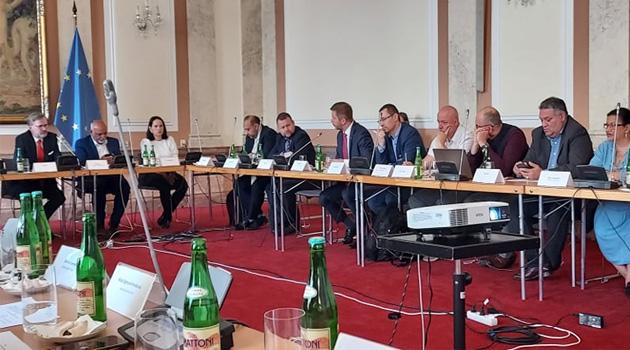NGO director in Czech Republic says politicians' rhetoric about "inadaptable" Roma is dangerous, some non-Roma refugees from Ukraine are reportedly aggressive toward local Roma here

“At the beginning of the war, I coincidentally came across a refugee Romani family from Kremenchuk in the Poltava region in Central Ukraine. They are four sisters with their children, the men in the family are fighting at the front. It was very difficult to accommodate the family somewhere even though the girls are at high school and one is even in university,” said the director of the Life Together NGO, Kumar Vishwanathan, for Czech television station Prima CNN News in an interview about Romani refugees from Ukraine.
The family lived in Vishwanathan’s own office for some time, eventually moving to a monastery in Ostrava run by the Redemptorists. “This Kremenchuk family has a total of 11 members, and seven of them have already found a job. They are fantastic, one of those women was even the head of a kitchen in an Israeli hotel once. My secret dream is for the family to open a restaurant in Ostrava with Ukrainian and Romani specialties,” he says.
The refugee facility in Vyšní Lhoty, where Life Together is working with the Romani refugees from Ukraine, has already seen 2 500 of them pass through, but all of a sudden no more than 200 – 250 are living there. Some returned to Ukraine, others have traveled to Germany, others are elsewhere in the Czech Republic – estimated at about 7 000 people total.
Vishwanathan, who teaches at Ostrava University as part of its Critical Social Work course, brings those students, some of whom are foreign nationals, to the refugee facility twice a week. “They are Spaniards, Portuguese, Koreans and one Ukrainian. When these students play spontaneously with the children, they make me happy because the little Romani kids love them completely. The Spanish students have now even raised EUR 2 000 for them through their alma mater. We bought them medicines, balls, marbles, shoes and underwear. However, my dream is to establish a choir in the camp and have them tour to perform for people throughout the country. They sing incredibly beautifully,” he explains.
Vishwanathan is critical of the approach taken toward Romani refugees both by part of Czech society and by some of their fellow refugees from Ukraine who are not Romani. He considers dangerous the rhetoric being publicly used by politicians referring to the refugees as “inadaptable Roma”, such as that used by Moravian-Silesian Regional Governor Ivo Vondrák (ANO).
“In March, several groups of Romani Ukrainians were accommodated at the expense of the refugee facilities, i.e., the Interior Ministry, in Ostrava. As long as the state paid for the Roma [refugees], the Regional Governor did not care, actually such conditions suited him. Starting on 1 April, however, accommodation for refugees has to be paid for by the Regional Authority, and Vondrák either could not or did not want to accomplish this task successfully. He got rid of the problem in quite an ugly way, tarring all the Romani refugees with the same brush, alleging that they have been destroying residential hotels, or stealing, and that they do not appreciate the aid they are given. By alleging that the community of Romani refugees as a whole is committing crimes, he has harmed all the respectable Roma immeasurable, like the family from Kremenchuk about whom I have been speaking,” Vishwanathan explains.
The NGO director considers the worst solution of all to be any in which the isolation of refugees is chosen instead of their integration – and where big camps for refugees, such as the ones in Syria, are built. Like Romani citizens in the Czech Republic, the Romani citizens of Ukraine are not themselves homogeneous.
“The Romani refugees have explained to us that there are about five groups of Roma in Ukraine, just like here in the Czech Republic we have Vlax Roma and Rumungri,” says Vishwanathan. Some Ukrainians from the “majority”, as he calls them, (i.e., non-Romani Ukrainians) have come to the Czech Republic with ideas about the Roma that are the same as those that once prevailed in the former Czechoslovakia and Czech Republic in the 1990s, and the NGO director speaks of complaints he is receiving from Romani residents in the Muglinov district of Ostrava.
A big community of Romani residents lives in that neighborhood, and currently there is a big group of refugees from Ukraine living there who are non-Roma and who have been granted temporary protection. “The local Roma tell me that the [non-Romani] refugees from Ukraine are behaving aggressively toward them. In stores, for example, they automatically cut in front of local Romani women in line, shoving into them, and insulting them vulgarly. The people from the Romani community have already told me that they are running out of patience and will have to resolve conflicts. ‘Our guys will beat them up soon’, I heard them predict. Nothing of the sort can be allowed to happen, I’m just giving you an example of what things are like. The Ukrainians sometimes bring interethnic conflicts here that we have long since resolved in the Czech Republic. Therefore, we have to communicate more about these things with the Ukrainian majority themselves. Explain to them that we are a little further along here,” says Vishwanathan.
Currently, most of the Romani refugees in the Czech Republic are coming from the region of Transcarpathia in Ukraine, where there are areas similar to those in eastern Slovakia. “However, not all of them are from among the poorest, many Carpathian Roma have worked in Slovakia or even in the Czech Republic, like the majority-society members from that region of Ukraine. Many speak only Hungarian due to the historical affiliation of that region with the Hungarians. Somebody always speaks Russian, though, sometimes even Slovak. We are able to reach agreement with them,” says the director of Life Together.
